Strategic Management at Unilever: Strategy, Environment, and Plans
VerifiedAdded on 2023/06/18
|9
|3338
|249
Report
AI Summary
This report provides a comprehensive analysis of Unilever's strategic management practices. It begins with an introduction to strategic management, followed by a critical assessment of the processes Unilever employs to determine its strategies. The report evaluates the impact of both internal and external environmental variations on Unilever's organizational strategy, including factors like organizational culture, human resources, physical assets, political, economic, social, technological, legal, and environmental influences. It reviews Unilever's strategic and action plans in light of these environmental changes, referencing the Unilever Annual Report and Accounts 2019 to support its findings. The analysis highlights Unilever's commitment to sustainability and adapting to evolving market conditions, offering insights into how the company maintains competitiveness and addresses social and environmental concerns. Desklib provides access to this and other solved assignments for students.
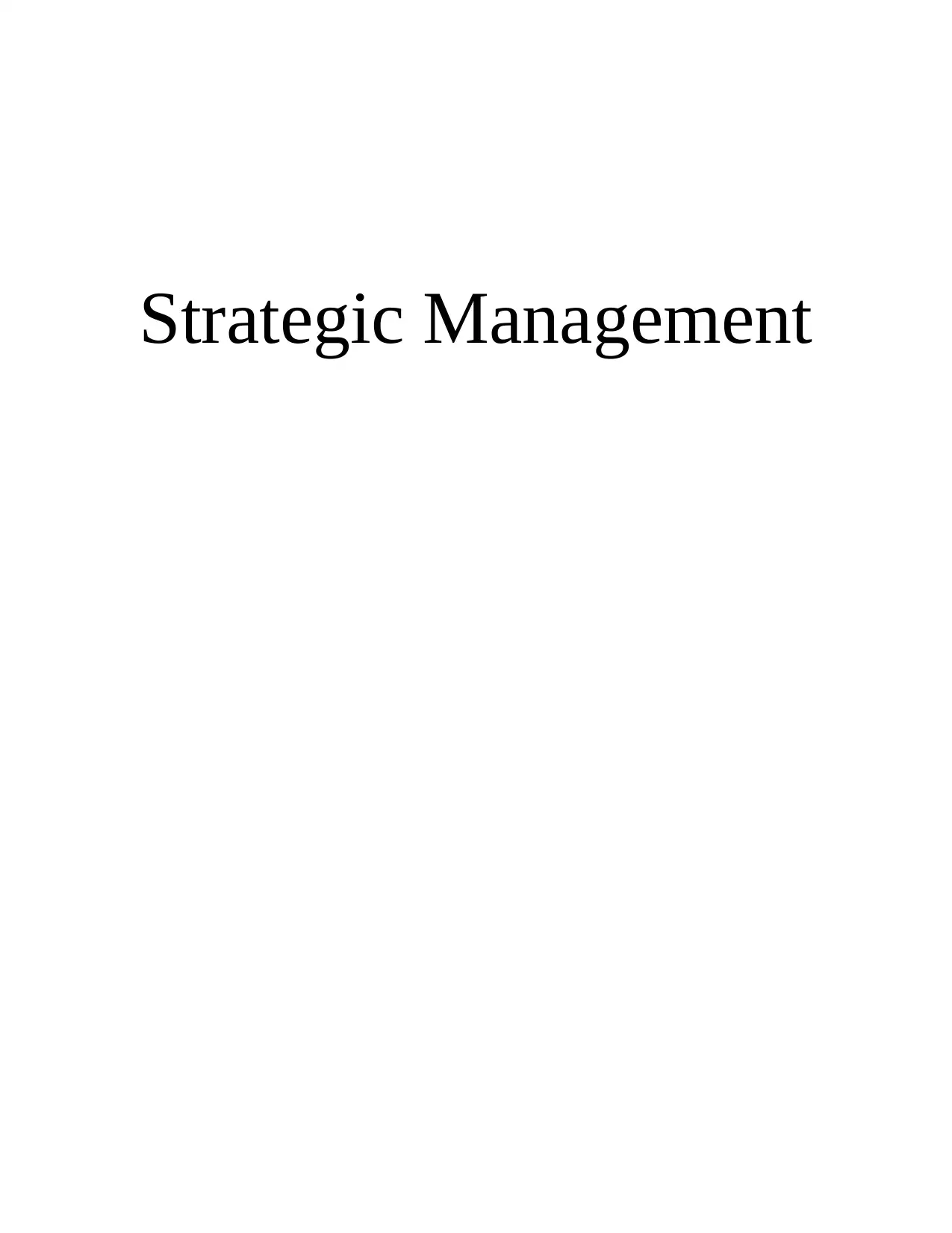
Strategic Management
Paraphrase This Document
Need a fresh take? Get an instant paraphrase of this document with our AI Paraphraser
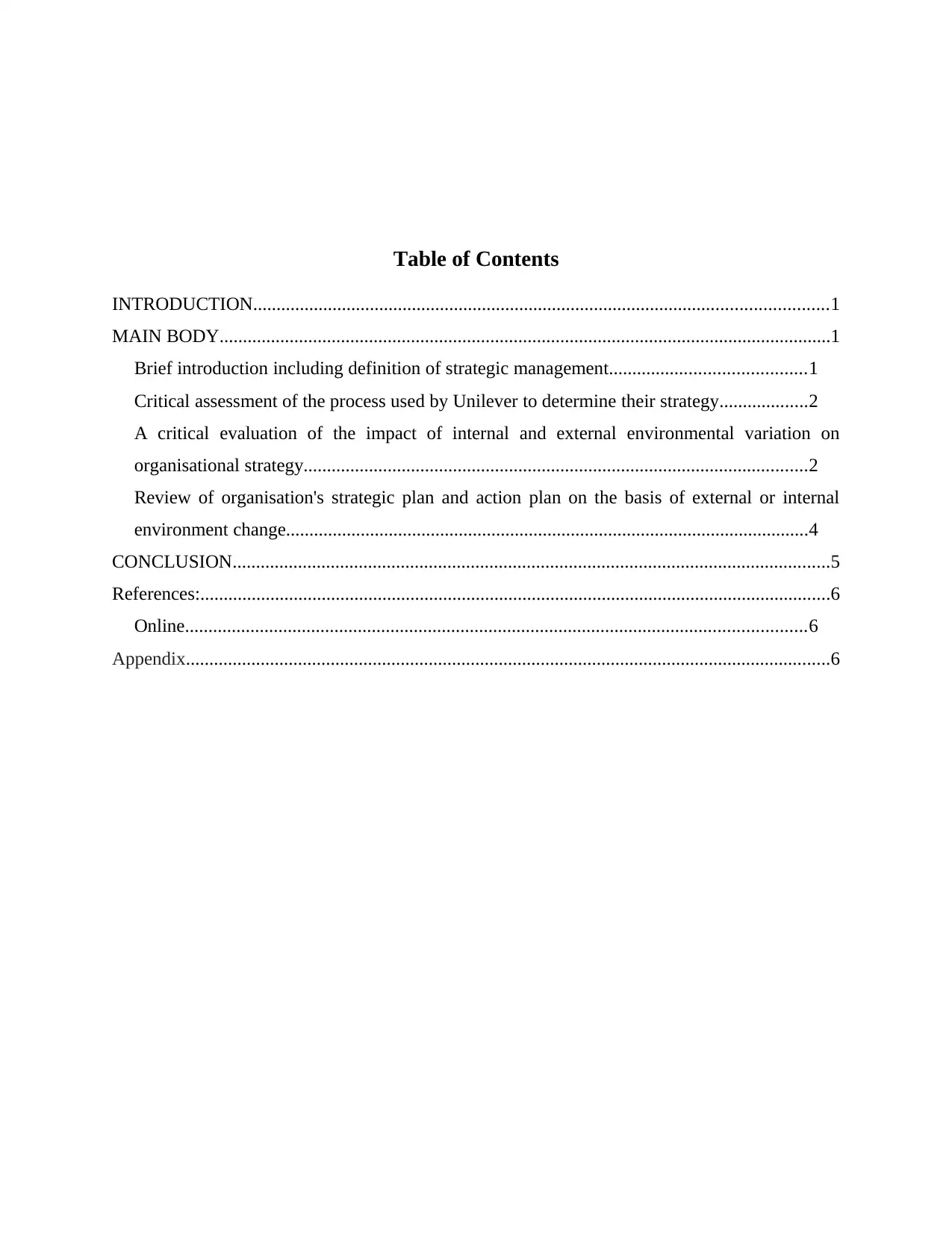
Table of Contents
INTRODUCTION...........................................................................................................................1
MAIN BODY...................................................................................................................................1
Brief introduction including definition of strategic management..........................................1
Critical assessment of the process used by Unilever to determine their strategy...................2
A critical evaluation of the impact of internal and external environmental variation on
organisational strategy............................................................................................................2
Review of organisation's strategic plan and action plan on the basis of external or internal
environment change................................................................................................................4
CONCLUSION................................................................................................................................5
References:.......................................................................................................................................6
Online.....................................................................................................................................6
Appendix..........................................................................................................................................6
INTRODUCTION...........................................................................................................................1
MAIN BODY...................................................................................................................................1
Brief introduction including definition of strategic management..........................................1
Critical assessment of the process used by Unilever to determine their strategy...................2
A critical evaluation of the impact of internal and external environmental variation on
organisational strategy............................................................................................................2
Review of organisation's strategic plan and action plan on the basis of external or internal
environment change................................................................................................................4
CONCLUSION................................................................................................................................5
References:.......................................................................................................................................6
Online.....................................................................................................................................6
Appendix..........................................................................................................................................6
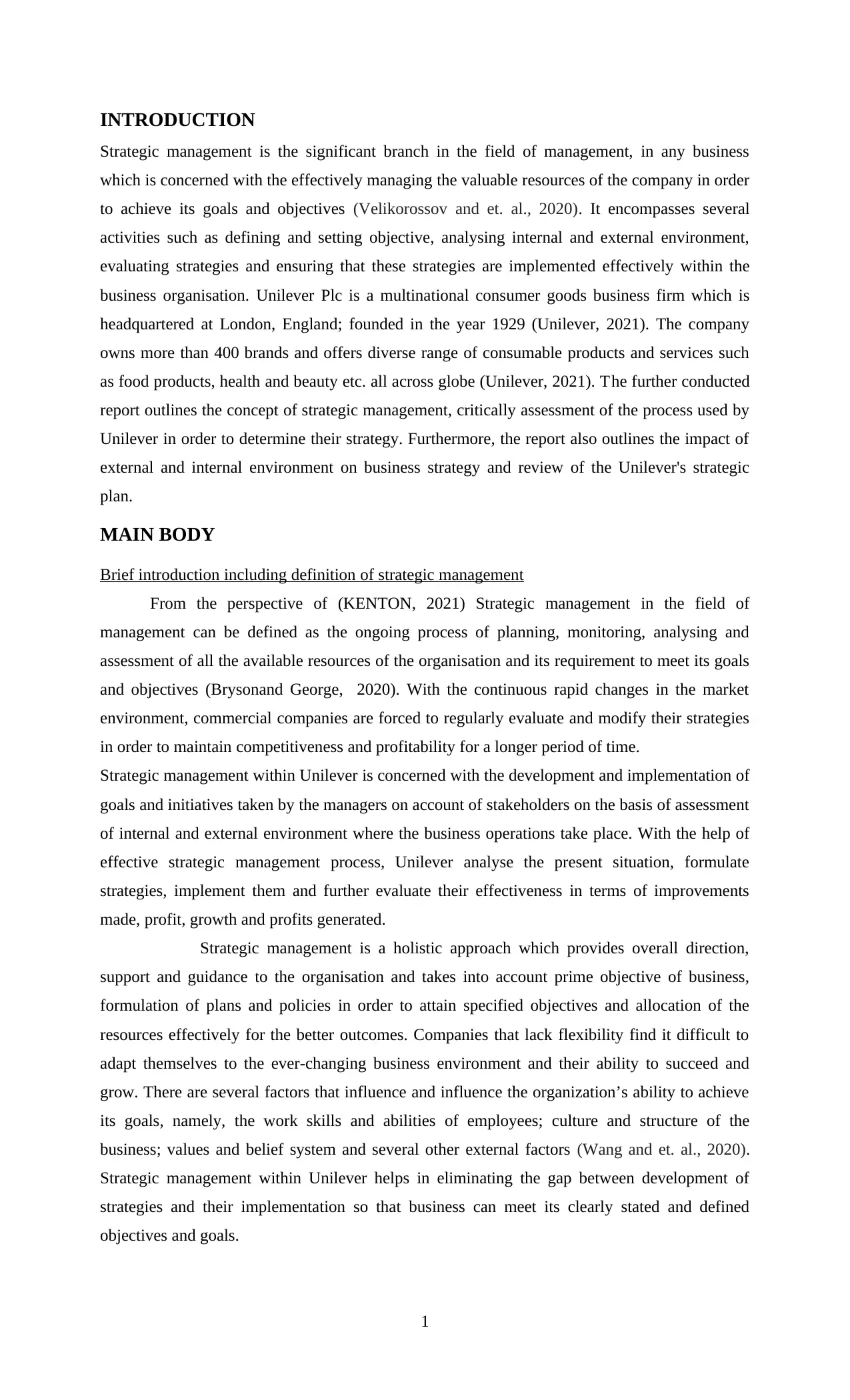
INTRODUCTION
Strategic management is the significant branch in the field of management, in any business
which is concerned with the effectively managing the valuable resources of the company in order
to achieve its goals and objectives (Velikorossov and et. al., 2020). It encompasses several
activities such as defining and setting objective, analysing internal and external environment,
evaluating strategies and ensuring that these strategies are implemented effectively within the
business organisation. Unilever Plc is a multinational consumer goods business firm which is
headquartered at London, England; founded in the year 1929 (Unilever, 2021). The company
owns more than 400 brands and offers diverse range of consumable products and services such
as food products, health and beauty etc. all across globe (Unilever, 2021). The further conducted
report outlines the concept of strategic management, critically assessment of the process used by
Unilever in order to determine their strategy. Furthermore, the report also outlines the impact of
external and internal environment on business strategy and review of the Unilever's strategic
plan.
MAIN BODY
Brief introduction including definition of strategic management
From the perspective of (KENTON, 2021) Strategic management in the field of
management can be defined as the ongoing process of planning, monitoring, analysing and
assessment of all the available resources of the organisation and its requirement to meet its goals
and objectives (Brysonand George, 2020). With the continuous rapid changes in the market
environment, commercial companies are forced to regularly evaluate and modify their strategies
in order to maintain competitiveness and profitability for a longer period of time.
Strategic management within Unilever is concerned with the development and implementation of
goals and initiatives taken by the managers on account of stakeholders on the basis of assessment
of internal and external environment where the business operations take place. With the help of
effective strategic management process, Unilever analyse the present situation, formulate
strategies, implement them and further evaluate their effectiveness in terms of improvements
made, profit, growth and profits generated.
Strategic management is a holistic approach which provides overall direction,
support and guidance to the organisation and takes into account prime objective of business,
formulation of plans and policies in order to attain specified objectives and allocation of the
resources effectively for the better outcomes. Companies that lack flexibility find it difficult to
adapt themselves to the ever-changing business environment and their ability to succeed and
grow. There are several factors that influence and influence the organization’s ability to achieve
its goals, namely, the work skills and abilities of employees; culture and structure of the
business; values and belief system and several other external factors (Wang and et. al., 2020).
Strategic management within Unilever helps in eliminating the gap between development of
strategies and their implementation so that business can meet its clearly stated and defined
objectives and goals.
1
Strategic management is the significant branch in the field of management, in any business
which is concerned with the effectively managing the valuable resources of the company in order
to achieve its goals and objectives (Velikorossov and et. al., 2020). It encompasses several
activities such as defining and setting objective, analysing internal and external environment,
evaluating strategies and ensuring that these strategies are implemented effectively within the
business organisation. Unilever Plc is a multinational consumer goods business firm which is
headquartered at London, England; founded in the year 1929 (Unilever, 2021). The company
owns more than 400 brands and offers diverse range of consumable products and services such
as food products, health and beauty etc. all across globe (Unilever, 2021). The further conducted
report outlines the concept of strategic management, critically assessment of the process used by
Unilever in order to determine their strategy. Furthermore, the report also outlines the impact of
external and internal environment on business strategy and review of the Unilever's strategic
plan.
MAIN BODY
Brief introduction including definition of strategic management
From the perspective of (KENTON, 2021) Strategic management in the field of
management can be defined as the ongoing process of planning, monitoring, analysing and
assessment of all the available resources of the organisation and its requirement to meet its goals
and objectives (Brysonand George, 2020). With the continuous rapid changes in the market
environment, commercial companies are forced to regularly evaluate and modify their strategies
in order to maintain competitiveness and profitability for a longer period of time.
Strategic management within Unilever is concerned with the development and implementation of
goals and initiatives taken by the managers on account of stakeholders on the basis of assessment
of internal and external environment where the business operations take place. With the help of
effective strategic management process, Unilever analyse the present situation, formulate
strategies, implement them and further evaluate their effectiveness in terms of improvements
made, profit, growth and profits generated.
Strategic management is a holistic approach which provides overall direction,
support and guidance to the organisation and takes into account prime objective of business,
formulation of plans and policies in order to attain specified objectives and allocation of the
resources effectively for the better outcomes. Companies that lack flexibility find it difficult to
adapt themselves to the ever-changing business environment and their ability to succeed and
grow. There are several factors that influence and influence the organization’s ability to achieve
its goals, namely, the work skills and abilities of employees; culture and structure of the
business; values and belief system and several other external factors (Wang and et. al., 2020).
Strategic management within Unilever helps in eliminating the gap between development of
strategies and their implementation so that business can meet its clearly stated and defined
objectives and goals.
1
⊘ This is a preview!⊘
Do you want full access?
Subscribe today to unlock all pages.

Trusted by 1+ million students worldwide
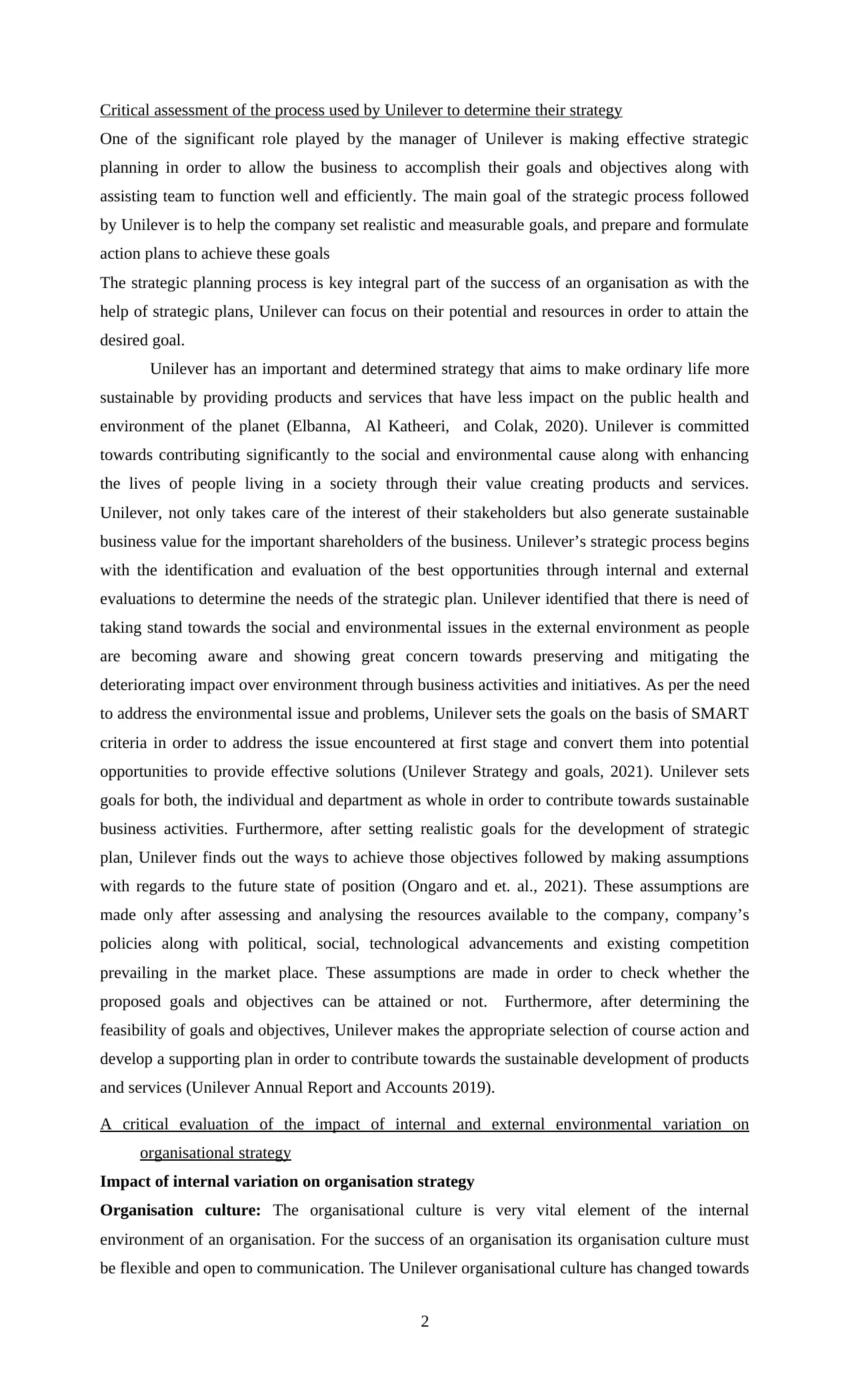
Critical assessment of the process used by Unilever to determine their strategy
One of the significant role played by the manager of Unilever is making effective strategic
planning in order to allow the business to accomplish their goals and objectives along with
assisting team to function well and efficiently. The main goal of the strategic process followed
by Unilever is to help the company set realistic and measurable goals, and prepare and formulate
action plans to achieve these goals
The strategic planning process is key integral part of the success of an organisation as with the
help of strategic plans, Unilever can focus on their potential and resources in order to attain the
desired goal.
Unilever has an important and determined strategy that aims to make ordinary life more
sustainable by providing products and services that have less impact on the public health and
environment of the planet (Elbanna, Al Katheeri, and Colak, 2020). Unilever is committed
towards contributing significantly to the social and environmental cause along with enhancing
the lives of people living in a society through their value creating products and services.
Unilever, not only takes care of the interest of their stakeholders but also generate sustainable
business value for the important shareholders of the business. Unilever’s strategic process begins
with the identification and evaluation of the best opportunities through internal and external
evaluations to determine the needs of the strategic plan. Unilever identified that there is need of
taking stand towards the social and environmental issues in the external environment as people
are becoming aware and showing great concern towards preserving and mitigating the
deteriorating impact over environment through business activities and initiatives. As per the need
to address the environmental issue and problems, Unilever sets the goals on the basis of SMART
criteria in order to address the issue encountered at first stage and convert them into potential
opportunities to provide effective solutions (Unilever Strategy and goals, 2021). Unilever sets
goals for both, the individual and department as whole in order to contribute towards sustainable
business activities. Furthermore, after setting realistic goals for the development of strategic
plan, Unilever finds out the ways to achieve those objectives followed by making assumptions
with regards to the future state of position (Ongaro and et. al., 2021). These assumptions are
made only after assessing and analysing the resources available to the company, company’s
policies along with political, social, technological advancements and existing competition
prevailing in the market place. These assumptions are made in order to check whether the
proposed goals and objectives can be attained or not. Furthermore, after determining the
feasibility of goals and objectives, Unilever makes the appropriate selection of course action and
develop a supporting plan in order to contribute towards the sustainable development of products
and services (Unilever Annual Report and Accounts 2019).
A critical evaluation of the impact of internal and external environmental variation on
organisational strategy
Impact of internal variation on organisation strategy
Organisation culture: The organisational culture is very vital element of the internal
environment of an organisation. For the success of an organisation its organisation culture must
be flexible and open to communication. The Unilever organisational culture has changed towards
2
One of the significant role played by the manager of Unilever is making effective strategic
planning in order to allow the business to accomplish their goals and objectives along with
assisting team to function well and efficiently. The main goal of the strategic process followed
by Unilever is to help the company set realistic and measurable goals, and prepare and formulate
action plans to achieve these goals
The strategic planning process is key integral part of the success of an organisation as with the
help of strategic plans, Unilever can focus on their potential and resources in order to attain the
desired goal.
Unilever has an important and determined strategy that aims to make ordinary life more
sustainable by providing products and services that have less impact on the public health and
environment of the planet (Elbanna, Al Katheeri, and Colak, 2020). Unilever is committed
towards contributing significantly to the social and environmental cause along with enhancing
the lives of people living in a society through their value creating products and services.
Unilever, not only takes care of the interest of their stakeholders but also generate sustainable
business value for the important shareholders of the business. Unilever’s strategic process begins
with the identification and evaluation of the best opportunities through internal and external
evaluations to determine the needs of the strategic plan. Unilever identified that there is need of
taking stand towards the social and environmental issues in the external environment as people
are becoming aware and showing great concern towards preserving and mitigating the
deteriorating impact over environment through business activities and initiatives. As per the need
to address the environmental issue and problems, Unilever sets the goals on the basis of SMART
criteria in order to address the issue encountered at first stage and convert them into potential
opportunities to provide effective solutions (Unilever Strategy and goals, 2021). Unilever sets
goals for both, the individual and department as whole in order to contribute towards sustainable
business activities. Furthermore, after setting realistic goals for the development of strategic
plan, Unilever finds out the ways to achieve those objectives followed by making assumptions
with regards to the future state of position (Ongaro and et. al., 2021). These assumptions are
made only after assessing and analysing the resources available to the company, company’s
policies along with political, social, technological advancements and existing competition
prevailing in the market place. These assumptions are made in order to check whether the
proposed goals and objectives can be attained or not. Furthermore, after determining the
feasibility of goals and objectives, Unilever makes the appropriate selection of course action and
develop a supporting plan in order to contribute towards the sustainable development of products
and services (Unilever Annual Report and Accounts 2019).
A critical evaluation of the impact of internal and external environmental variation on
organisational strategy
Impact of internal variation on organisation strategy
Organisation culture: The organisational culture is very vital element of the internal
environment of an organisation. For the success of an organisation its organisation culture must
be flexible and open to communication. The Unilever organisational culture has changed towards
2
Paraphrase This Document
Need a fresh take? Get an instant paraphrase of this document with our AI Paraphraser
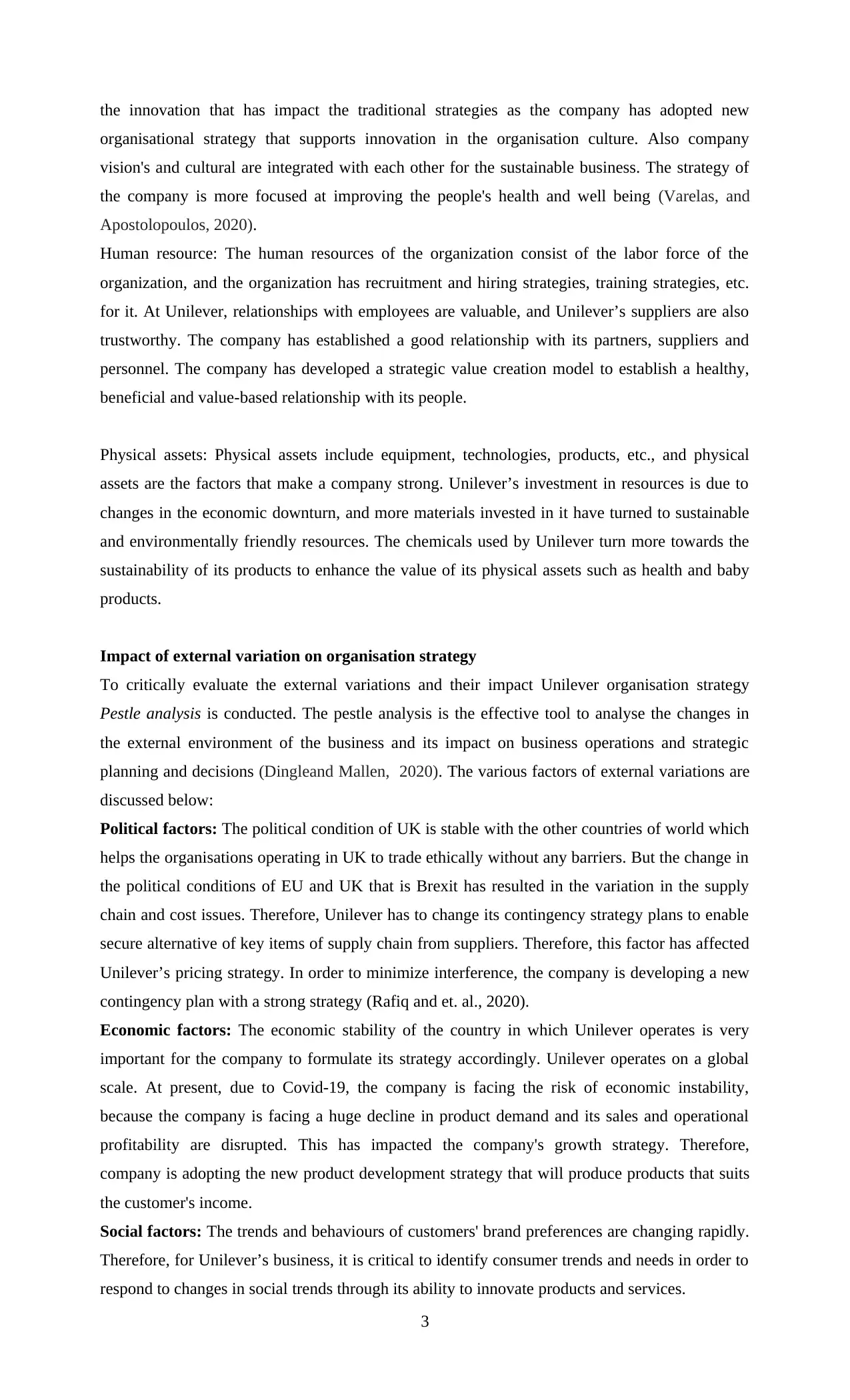
the innovation that has impact the traditional strategies as the company has adopted new
organisational strategy that supports innovation in the organisation culture. Also company
vision's and cultural are integrated with each other for the sustainable business. The strategy of
the company is more focused at improving the people's health and well being (Varelas, and
Apostolopoulos, 2020).
Human resource: The human resources of the organization consist of the labor force of the
organization, and the organization has recruitment and hiring strategies, training strategies, etc.
for it. At Unilever, relationships with employees are valuable, and Unilever’s suppliers are also
trustworthy. The company has established a good relationship with its partners, suppliers and
personnel. The company has developed a strategic value creation model to establish a healthy,
beneficial and value-based relationship with its people.
Physical assets: Physical assets include equipment, technologies, products, etc., and physical
assets are the factors that make a company strong. Unilever’s investment in resources is due to
changes in the economic downturn, and more materials invested in it have turned to sustainable
and environmentally friendly resources. The chemicals used by Unilever turn more towards the
sustainability of its products to enhance the value of its physical assets such as health and baby
products.
Impact of external variation on organisation strategy
To critically evaluate the external variations and their impact Unilever organisation strategy
Pestle analysis is conducted. The pestle analysis is the effective tool to analyse the changes in
the external environment of the business and its impact on business operations and strategic
planning and decisions (Dingleand Mallen, 2020). The various factors of external variations are
discussed below:
Political factors: The political condition of UK is stable with the other countries of world which
helps the organisations operating in UK to trade ethically without any barriers. But the change in
the political conditions of EU and UK that is Brexit has resulted in the variation in the supply
chain and cost issues. Therefore, Unilever has to change its contingency strategy plans to enable
secure alternative of key items of supply chain from suppliers. Therefore, this factor has affected
Unilever’s pricing strategy. In order to minimize interference, the company is developing a new
contingency plan with a strong strategy (Rafiq and et. al., 2020).
Economic factors: The economic stability of the country in which Unilever operates is very
important for the company to formulate its strategy accordingly. Unilever operates on a global
scale. At present, due to Covid-19, the company is facing the risk of economic instability,
because the company is facing a huge decline in product demand and its sales and operational
profitability are disrupted. This has impacted the company's growth strategy. Therefore,
company is adopting the new product development strategy that will produce products that suits
the customer's income.
Social factors: The trends and behaviours of customers' brand preferences are changing rapidly.
Therefore, for Unilever’s business, it is critical to identify consumer trends and needs in order to
respond to changes in social trends through its ability to innovate products and services.
3
organisational strategy that supports innovation in the organisation culture. Also company
vision's and cultural are integrated with each other for the sustainable business. The strategy of
the company is more focused at improving the people's health and well being (Varelas, and
Apostolopoulos, 2020).
Human resource: The human resources of the organization consist of the labor force of the
organization, and the organization has recruitment and hiring strategies, training strategies, etc.
for it. At Unilever, relationships with employees are valuable, and Unilever’s suppliers are also
trustworthy. The company has established a good relationship with its partners, suppliers and
personnel. The company has developed a strategic value creation model to establish a healthy,
beneficial and value-based relationship with its people.
Physical assets: Physical assets include equipment, technologies, products, etc., and physical
assets are the factors that make a company strong. Unilever’s investment in resources is due to
changes in the economic downturn, and more materials invested in it have turned to sustainable
and environmentally friendly resources. The chemicals used by Unilever turn more towards the
sustainability of its products to enhance the value of its physical assets such as health and baby
products.
Impact of external variation on organisation strategy
To critically evaluate the external variations and their impact Unilever organisation strategy
Pestle analysis is conducted. The pestle analysis is the effective tool to analyse the changes in
the external environment of the business and its impact on business operations and strategic
planning and decisions (Dingleand Mallen, 2020). The various factors of external variations are
discussed below:
Political factors: The political condition of UK is stable with the other countries of world which
helps the organisations operating in UK to trade ethically without any barriers. But the change in
the political conditions of EU and UK that is Brexit has resulted in the variation in the supply
chain and cost issues. Therefore, Unilever has to change its contingency strategy plans to enable
secure alternative of key items of supply chain from suppliers. Therefore, this factor has affected
Unilever’s pricing strategy. In order to minimize interference, the company is developing a new
contingency plan with a strong strategy (Rafiq and et. al., 2020).
Economic factors: The economic stability of the country in which Unilever operates is very
important for the company to formulate its strategy accordingly. Unilever operates on a global
scale. At present, due to Covid-19, the company is facing the risk of economic instability,
because the company is facing a huge decline in product demand and its sales and operational
profitability are disrupted. This has impacted the company's growth strategy. Therefore,
company is adopting the new product development strategy that will produce products that suits
the customer's income.
Social factors: The trends and behaviours of customers' brand preferences are changing rapidly.
Therefore, for Unilever’s business, it is critical to identify consumer trends and needs in order to
respond to changes in social trends through its ability to innovate products and services.
3
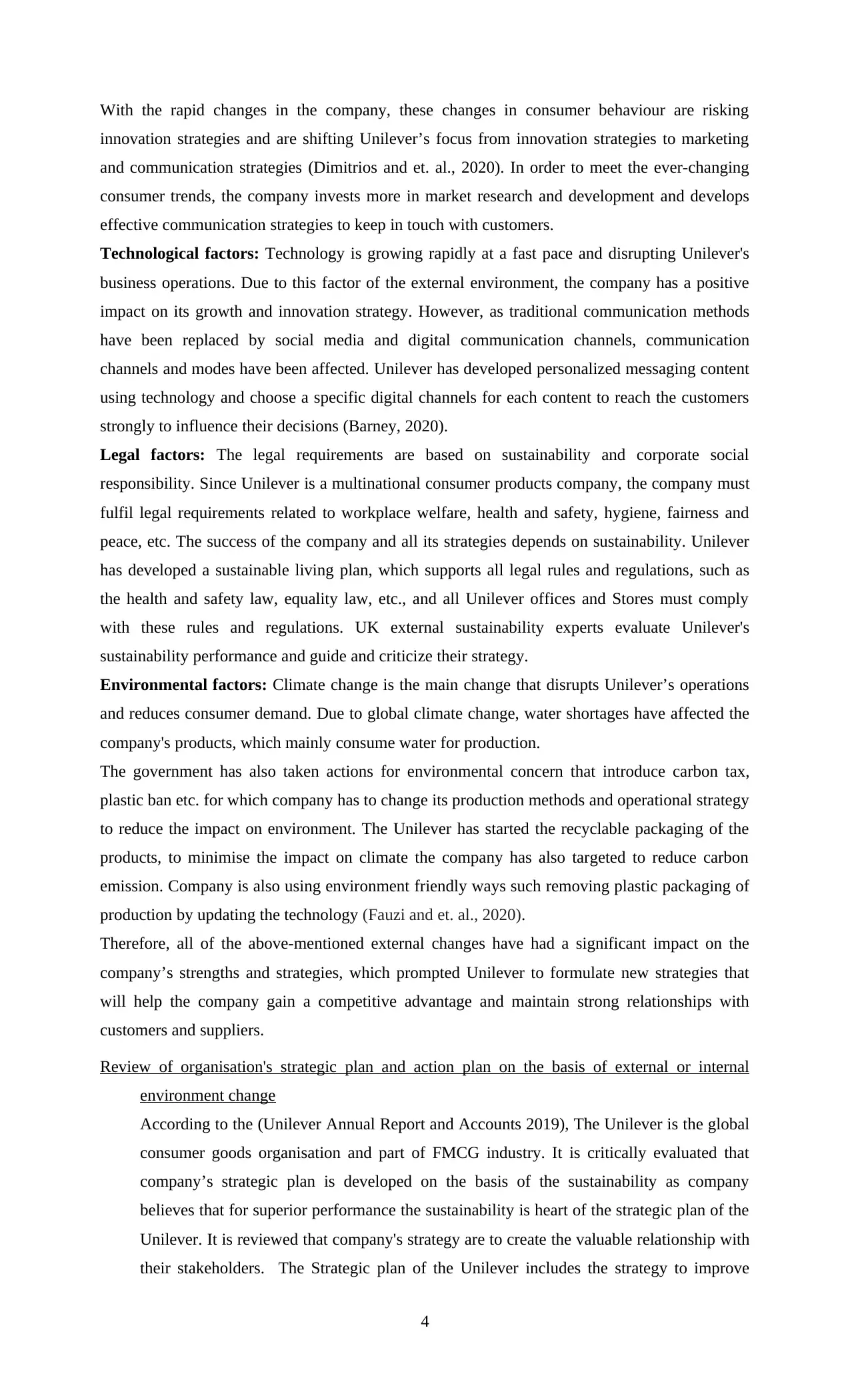
With the rapid changes in the company, these changes in consumer behaviour are risking
innovation strategies and are shifting Unilever’s focus from innovation strategies to marketing
and communication strategies (Dimitrios and et. al., 2020). In order to meet the ever-changing
consumer trends, the company invests more in market research and development and develops
effective communication strategies to keep in touch with customers.
Technological factors: Technology is growing rapidly at a fast pace and disrupting Unilever's
business operations. Due to this factor of the external environment, the company has a positive
impact on its growth and innovation strategy. However, as traditional communication methods
have been replaced by social media and digital communication channels, communication
channels and modes have been affected. Unilever has developed personalized messaging content
using technology and choose a specific digital channels for each content to reach the customers
strongly to influence their decisions (Barney, 2020).
Legal factors: The legal requirements are based on sustainability and corporate social
responsibility. Since Unilever is a multinational consumer products company, the company must
fulfil legal requirements related to workplace welfare, health and safety, hygiene, fairness and
peace, etc. The success of the company and all its strategies depends on sustainability. Unilever
has developed a sustainable living plan, which supports all legal rules and regulations, such as
the health and safety law, equality law, etc., and all Unilever offices and Stores must comply
with these rules and regulations. UK external sustainability experts evaluate Unilever's
sustainability performance and guide and criticize their strategy.
Environmental factors: Climate change is the main change that disrupts Unilever’s operations
and reduces consumer demand. Due to global climate change, water shortages have affected the
company's products, which mainly consume water for production.
The government has also taken actions for environmental concern that introduce carbon tax,
plastic ban etc. for which company has to change its production methods and operational strategy
to reduce the impact on environment. The Unilever has started the recyclable packaging of the
products, to minimise the impact on climate the company has also targeted to reduce carbon
emission. Company is also using environment friendly ways such removing plastic packaging of
production by updating the technology (Fauzi and et. al., 2020).
Therefore, all of the above-mentioned external changes have had a significant impact on the
company’s strengths and strategies, which prompted Unilever to formulate new strategies that
will help the company gain a competitive advantage and maintain strong relationships with
customers and suppliers.
Review of organisation's strategic plan and action plan on the basis of external or internal
environment change
According to the (Unilever Annual Report and Accounts 2019), The Unilever is the global
consumer goods organisation and part of FMCG industry. It is critically evaluated that
company’s strategic plan is developed on the basis of the sustainability as company
believes that for superior performance the sustainability is heart of the strategic plan of the
Unilever. It is reviewed that company's strategy are to create the valuable relationship with
their stakeholders. The Strategic plan of the Unilever includes the strategy to improve
4
innovation strategies and are shifting Unilever’s focus from innovation strategies to marketing
and communication strategies (Dimitrios and et. al., 2020). In order to meet the ever-changing
consumer trends, the company invests more in market research and development and develops
effective communication strategies to keep in touch with customers.
Technological factors: Technology is growing rapidly at a fast pace and disrupting Unilever's
business operations. Due to this factor of the external environment, the company has a positive
impact on its growth and innovation strategy. However, as traditional communication methods
have been replaced by social media and digital communication channels, communication
channels and modes have been affected. Unilever has developed personalized messaging content
using technology and choose a specific digital channels for each content to reach the customers
strongly to influence their decisions (Barney, 2020).
Legal factors: The legal requirements are based on sustainability and corporate social
responsibility. Since Unilever is a multinational consumer products company, the company must
fulfil legal requirements related to workplace welfare, health and safety, hygiene, fairness and
peace, etc. The success of the company and all its strategies depends on sustainability. Unilever
has developed a sustainable living plan, which supports all legal rules and regulations, such as
the health and safety law, equality law, etc., and all Unilever offices and Stores must comply
with these rules and regulations. UK external sustainability experts evaluate Unilever's
sustainability performance and guide and criticize their strategy.
Environmental factors: Climate change is the main change that disrupts Unilever’s operations
and reduces consumer demand. Due to global climate change, water shortages have affected the
company's products, which mainly consume water for production.
The government has also taken actions for environmental concern that introduce carbon tax,
plastic ban etc. for which company has to change its production methods and operational strategy
to reduce the impact on environment. The Unilever has started the recyclable packaging of the
products, to minimise the impact on climate the company has also targeted to reduce carbon
emission. Company is also using environment friendly ways such removing plastic packaging of
production by updating the technology (Fauzi and et. al., 2020).
Therefore, all of the above-mentioned external changes have had a significant impact on the
company’s strengths and strategies, which prompted Unilever to formulate new strategies that
will help the company gain a competitive advantage and maintain strong relationships with
customers and suppliers.
Review of organisation's strategic plan and action plan on the basis of external or internal
environment change
According to the (Unilever Annual Report and Accounts 2019), The Unilever is the global
consumer goods organisation and part of FMCG industry. It is critically evaluated that
company’s strategic plan is developed on the basis of the sustainability as company
believes that for superior performance the sustainability is heart of the strategic plan of the
Unilever. It is reviewed that company's strategy are to create the valuable relationship with
their stakeholders. The Strategic plan of the Unilever includes the strategy to improve
4
⊘ This is a preview!⊘
Do you want full access?
Subscribe today to unlock all pages.

Trusted by 1+ million students worldwide
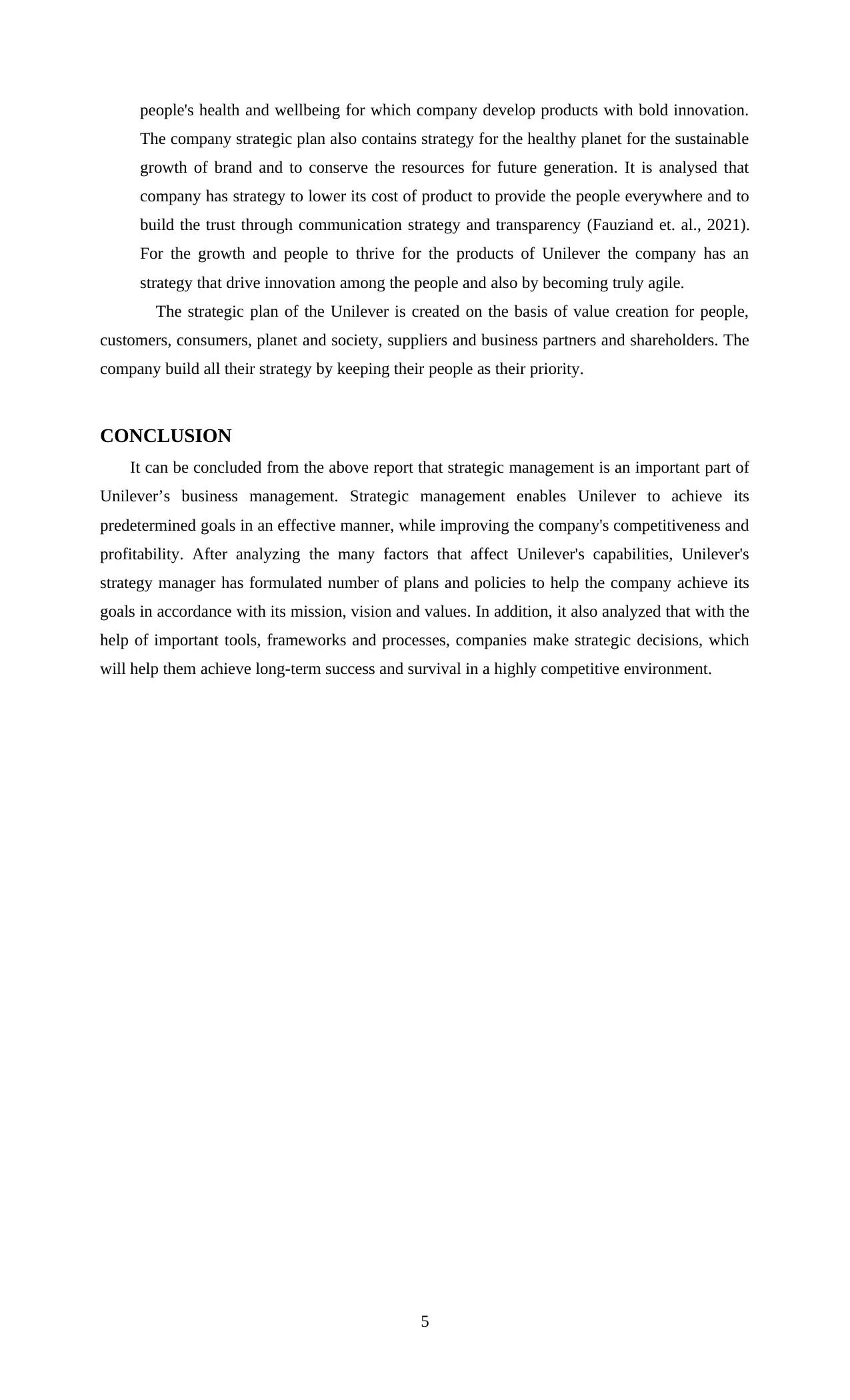
people's health and wellbeing for which company develop products with bold innovation.
The company strategic plan also contains strategy for the healthy planet for the sustainable
growth of brand and to conserve the resources for future generation. It is analysed that
company has strategy to lower its cost of product to provide the people everywhere and to
build the trust through communication strategy and transparency (Fauziand et. al., 2021).
For the growth and people to thrive for the products of Unilever the company has an
strategy that drive innovation among the people and also by becoming truly agile.
The strategic plan of the Unilever is created on the basis of value creation for people,
customers, consumers, planet and society, suppliers and business partners and shareholders. The
company build all their strategy by keeping their people as their priority.
CONCLUSION
It can be concluded from the above report that strategic management is an important part of
Unilever’s business management. Strategic management enables Unilever to achieve its
predetermined goals in an effective manner, while improving the company's competitiveness and
profitability. After analyzing the many factors that affect Unilever's capabilities, Unilever's
strategy manager has formulated number of plans and policies to help the company achieve its
goals in accordance with its mission, vision and values. In addition, it also analyzed that with the
help of important tools, frameworks and processes, companies make strategic decisions, which
will help them achieve long-term success and survival in a highly competitive environment.
5
The company strategic plan also contains strategy for the healthy planet for the sustainable
growth of brand and to conserve the resources for future generation. It is analysed that
company has strategy to lower its cost of product to provide the people everywhere and to
build the trust through communication strategy and transparency (Fauziand et. al., 2021).
For the growth and people to thrive for the products of Unilever the company has an
strategy that drive innovation among the people and also by becoming truly agile.
The strategic plan of the Unilever is created on the basis of value creation for people,
customers, consumers, planet and society, suppliers and business partners and shareholders. The
company build all their strategy by keeping their people as their priority.
CONCLUSION
It can be concluded from the above report that strategic management is an important part of
Unilever’s business management. Strategic management enables Unilever to achieve its
predetermined goals in an effective manner, while improving the company's competitiveness and
profitability. After analyzing the many factors that affect Unilever's capabilities, Unilever's
strategy manager has formulated number of plans and policies to help the company achieve its
goals in accordance with its mission, vision and values. In addition, it also analyzed that with the
help of important tools, frameworks and processes, companies make strategic decisions, which
will help them achieve long-term success and survival in a highly competitive environment.
5
Paraphrase This Document
Need a fresh take? Get an instant paraphrase of this document with our AI Paraphraser
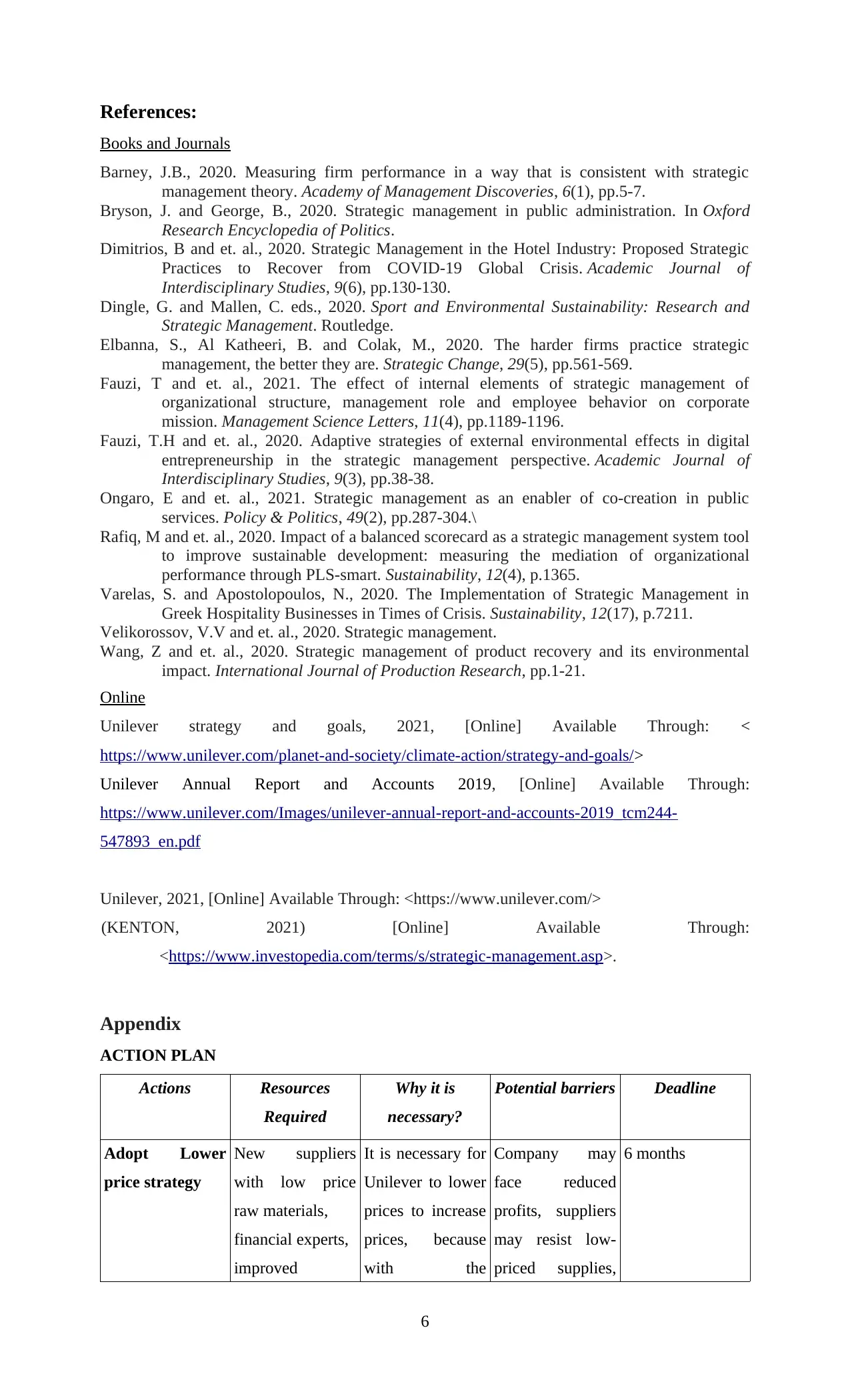
References:
Books and Journals
Barney, J.B., 2020. Measuring firm performance in a way that is consistent with strategic
management theory. Academy of Management Discoveries, 6(1), pp.5-7.
Bryson, J. and George, B., 2020. Strategic management in public administration. In Oxford
Research Encyclopedia of Politics.
Dimitrios, B and et. al., 2020. Strategic Management in the Hotel Industry: Proposed Strategic
Practices to Recover from COVID-19 Global Crisis. Academic Journal of
Interdisciplinary Studies, 9(6), pp.130-130.
Dingle, G. and Mallen, C. eds., 2020. Sport and Environmental Sustainability: Research and
Strategic Management. Routledge.
Elbanna, S., Al Katheeri, B. and Colak, M., 2020. The harder firms practice strategic
management, the better they are. Strategic Change, 29(5), pp.561-569.
Fauzi, T and et. al., 2021. The effect of internal elements of strategic management of
organizational structure, management role and employee behavior on corporate
mission. Management Science Letters, 11(4), pp.1189-1196.
Fauzi, T.H and et. al., 2020. Adaptive strategies of external environmental effects in digital
entrepreneurship in the strategic management perspective. Academic Journal of
Interdisciplinary Studies, 9(3), pp.38-38.
Ongaro, E and et. al., 2021. Strategic management as an enabler of co-creation in public
services. Policy & Politics, 49(2), pp.287-304.\
Rafiq, M and et. al., 2020. Impact of a balanced scorecard as a strategic management system tool
to improve sustainable development: measuring the mediation of organizational
performance through PLS-smart. Sustainability, 12(4), p.1365.
Varelas, S. and Apostolopoulos, N., 2020. The Implementation of Strategic Management in
Greek Hospitality Businesses in Times of Crisis. Sustainability, 12(17), p.7211.
Velikorossov, V.V and et. al., 2020. Strategic management.
Wang, Z and et. al., 2020. Strategic management of product recovery and its environmental
impact. International Journal of Production Research, pp.1-21.
Online
Unilever strategy and goals, 2021, [Online] Available Through: <
https://www.unilever.com/planet-and-society/climate-action/strategy-and-goals/>
Unilever Annual Report and Accounts 2019, [Online] Available Through:
https://www.unilever.com/Images/unilever-annual-report-and-accounts-2019_tcm244-
547893_en.pdf
Unilever, 2021, [Online] Available Through: <https://www.unilever.com/>
(KENTON, 2021) [Online] Available Through:
<https://www.investopedia.com/terms/s/strategic-management.asp>.
Appendix
ACTION PLAN
Actions Resources
Required
Why it is
necessary?
Potential barriers Deadline
Adopt Lower
price strategy
New suppliers
with low price
raw materials,
financial experts,
improved
It is necessary for
Unilever to lower
prices to increase
prices, because
with the
Company may
face reduced
profits, suppliers
may resist low-
priced supplies,
6 months
6
Books and Journals
Barney, J.B., 2020. Measuring firm performance in a way that is consistent with strategic
management theory. Academy of Management Discoveries, 6(1), pp.5-7.
Bryson, J. and George, B., 2020. Strategic management in public administration. In Oxford
Research Encyclopedia of Politics.
Dimitrios, B and et. al., 2020. Strategic Management in the Hotel Industry: Proposed Strategic
Practices to Recover from COVID-19 Global Crisis. Academic Journal of
Interdisciplinary Studies, 9(6), pp.130-130.
Dingle, G. and Mallen, C. eds., 2020. Sport and Environmental Sustainability: Research and
Strategic Management. Routledge.
Elbanna, S., Al Katheeri, B. and Colak, M., 2020. The harder firms practice strategic
management, the better they are. Strategic Change, 29(5), pp.561-569.
Fauzi, T and et. al., 2021. The effect of internal elements of strategic management of
organizational structure, management role and employee behavior on corporate
mission. Management Science Letters, 11(4), pp.1189-1196.
Fauzi, T.H and et. al., 2020. Adaptive strategies of external environmental effects in digital
entrepreneurship in the strategic management perspective. Academic Journal of
Interdisciplinary Studies, 9(3), pp.38-38.
Ongaro, E and et. al., 2021. Strategic management as an enabler of co-creation in public
services. Policy & Politics, 49(2), pp.287-304.\
Rafiq, M and et. al., 2020. Impact of a balanced scorecard as a strategic management system tool
to improve sustainable development: measuring the mediation of organizational
performance through PLS-smart. Sustainability, 12(4), p.1365.
Varelas, S. and Apostolopoulos, N., 2020. The Implementation of Strategic Management in
Greek Hospitality Businesses in Times of Crisis. Sustainability, 12(17), p.7211.
Velikorossov, V.V and et. al., 2020. Strategic management.
Wang, Z and et. al., 2020. Strategic management of product recovery and its environmental
impact. International Journal of Production Research, pp.1-21.
Online
Unilever strategy and goals, 2021, [Online] Available Through: <
https://www.unilever.com/planet-and-society/climate-action/strategy-and-goals/>
Unilever Annual Report and Accounts 2019, [Online] Available Through:
https://www.unilever.com/Images/unilever-annual-report-and-accounts-2019_tcm244-
547893_en.pdf
Unilever, 2021, [Online] Available Through: <https://www.unilever.com/>
(KENTON, 2021) [Online] Available Through:
<https://www.investopedia.com/terms/s/strategic-management.asp>.
Appendix
ACTION PLAN
Actions Resources
Required
Why it is
necessary?
Potential barriers Deadline
Adopt Lower
price strategy
New suppliers
with low price
raw materials,
financial experts,
improved
It is necessary for
Unilever to lower
prices to increase
prices, because
with the
Company may
face reduced
profits, suppliers
may resist low-
priced supplies,
6 months
6
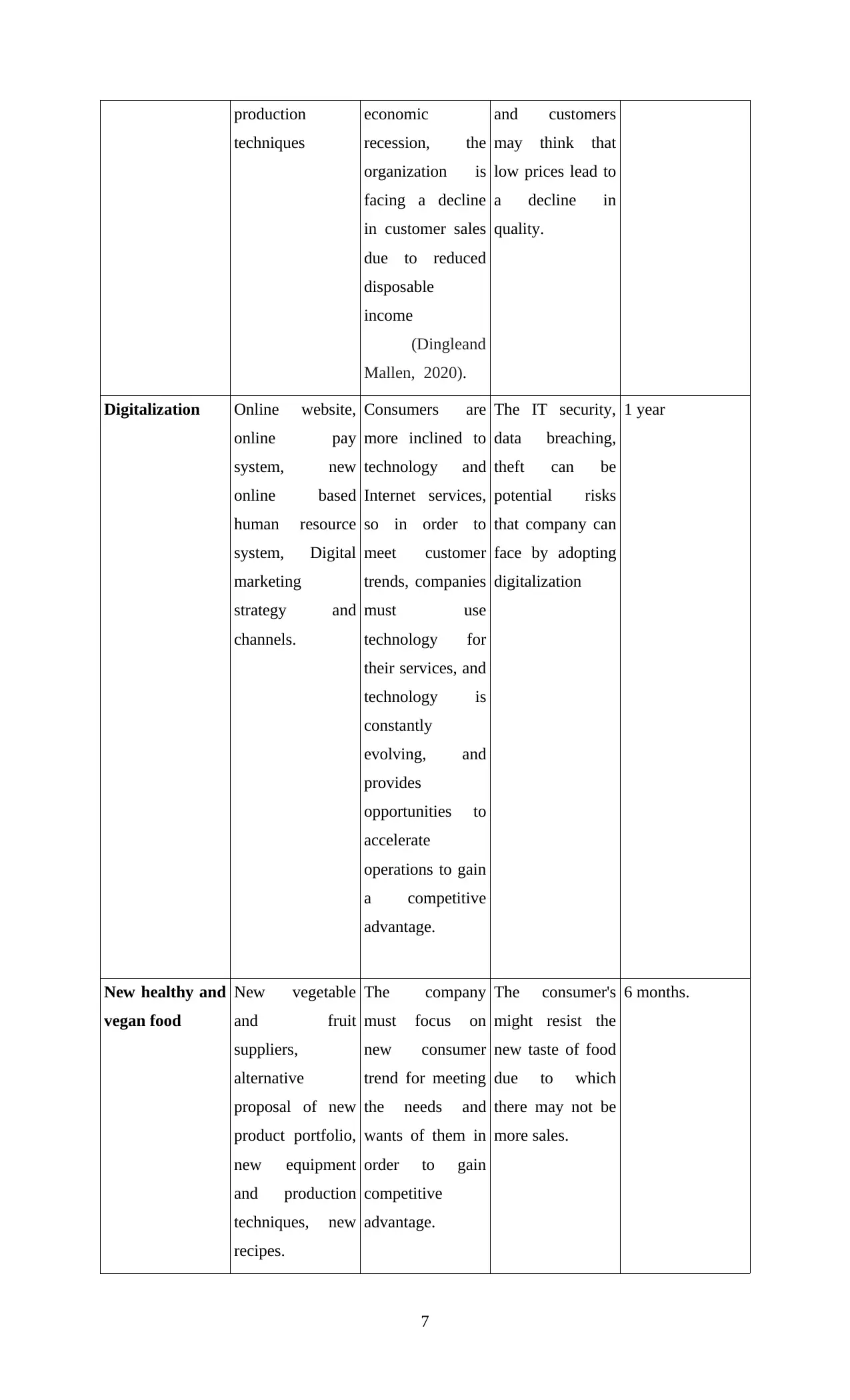
production
techniques
economic
recession, the
organization is
facing a decline
in customer sales
due to reduced
disposable
income
(Dingleand
Mallen, 2020).
and customers
may think that
low prices lead to
a decline in
quality.
Digitalization Online website,
online pay
system, new
online based
human resource
system, Digital
marketing
strategy and
channels.
Consumers are
more inclined to
technology and
Internet services,
so in order to
meet customer
trends, companies
must use
technology for
their services, and
technology is
constantly
evolving, and
provides
opportunities to
accelerate
operations to gain
a competitive
advantage.
The IT security,
data breaching,
theft can be
potential risks
that company can
face by adopting
digitalization
1 year
New healthy and
vegan food
New vegetable
and fruit
suppliers,
alternative
proposal of new
product portfolio,
new equipment
and production
techniques, new
recipes.
The company
must focus on
new consumer
trend for meeting
the needs and
wants of them in
order to gain
competitive
advantage.
The consumer's
might resist the
new taste of food
due to which
there may not be
more sales.
6 months.
7
techniques
economic
recession, the
organization is
facing a decline
in customer sales
due to reduced
disposable
income
(Dingleand
Mallen, 2020).
and customers
may think that
low prices lead to
a decline in
quality.
Digitalization Online website,
online pay
system, new
online based
human resource
system, Digital
marketing
strategy and
channels.
Consumers are
more inclined to
technology and
Internet services,
so in order to
meet customer
trends, companies
must use
technology for
their services, and
technology is
constantly
evolving, and
provides
opportunities to
accelerate
operations to gain
a competitive
advantage.
The IT security,
data breaching,
theft can be
potential risks
that company can
face by adopting
digitalization
1 year
New healthy and
vegan food
New vegetable
and fruit
suppliers,
alternative
proposal of new
product portfolio,
new equipment
and production
techniques, new
recipes.
The company
must focus on
new consumer
trend for meeting
the needs and
wants of them in
order to gain
competitive
advantage.
The consumer's
might resist the
new taste of food
due to which
there may not be
more sales.
6 months.
7
⊘ This is a preview!⊘
Do you want full access?
Subscribe today to unlock all pages.

Trusted by 1+ million students worldwide
1 out of 9
Related Documents
Your All-in-One AI-Powered Toolkit for Academic Success.
+13062052269
info@desklib.com
Available 24*7 on WhatsApp / Email
![[object Object]](/_next/static/media/star-bottom.7253800d.svg)
Unlock your academic potential
Copyright © 2020–2026 A2Z Services. All Rights Reserved. Developed and managed by ZUCOL.



